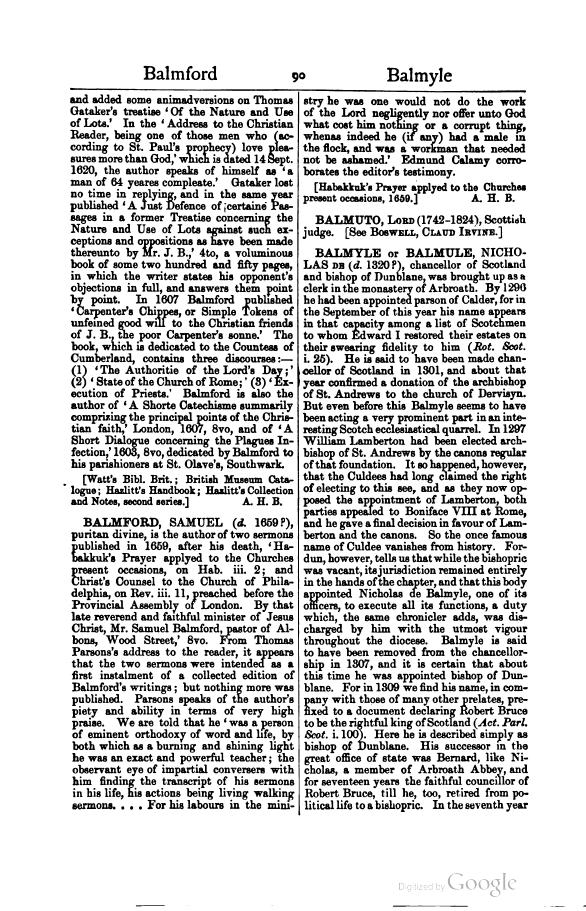and added some animadversions on Thomas Gataker's treatise 'Of the Nature and Use of Lots.' In the 'Address to the Christian Reader, being one of those men who (according to St. Paul's prophecy) love pleasures more than God' which is dated 14 Sept. 1620, the author speaks of himself as 'a man of 64 yeares compleate.' Gataker lost no time in replying, and in the same year published 'A Just Defence of certaine Passages in a former Treatise concerning the Nature and Use of Lots against such exceptions and oppositions as have been made thereunto by Mr. J. B.,' 4to, a voluminous book of some two hundred and fifty pages, in which the writer states his opponent's objections in full, and answers them point by point. In 1607 Balmford published 'Carpenter's Chippes, or Simple Tokens of unfeined good will to the Christian friends of J. B., the poor Carpenter's sonne.' The book, which is dedicated to the Countess of Cumberland, contains three discourses:— (1) 'The Authoritie of the Lord's Day;' (2) 'State of the Church of Rome; (3) ' Execution of Priests.' Balmford is also the author of 'A Shorte Catechisme summarily comprizing the principal points of the Christian faith,' London, 1607, 8vo, and of 'A Short Dialogue concerning the Plagues Infection,' 1603, 8 vo, dedicated by Balmford to his parishioners at St. Olave's, Southwark.
[Watt's Bibl. Brit.; British Museum Catalogue; Hazlitt's Handbook; Hazlitt's Collection and NotcH, second series.]
BALMFORD, SAMUEL (d. 1659?), puritan divine, is the author of two sermons published in 1659, after his death, 'Habakkuk's Prayer applyed to the Churches present occasions, on Hab. iii. 2; and Christ's Counsel to the Church of Philadelphia, on Rev. iii. 11, preached before the Provincial Assembly at London. By that late reverend and faithful minister of Jesus Christ, Mr. Samuel Balmford, pastor of Albons, Wood Street,' 8vo. From Thomas Parsons's address to the reader, it appears that the two sermons were intended as a first instalment of a collected edition of Balmford's writings; but nothing more was published. Parsons speaks of the author's piety and ability in terms of very high praise. We are told that he 'was a person of eminent orthodoxy of word and life, by both which as a burning and shining light he was an exact and powerful teacher; the observant eye of impartial conversers with him finding the transcript of his sermons in his life, his actions being living walking sermons. … For his labours in the ministry he was one would not do the work of the Lord negligently nor offer unto God what cost him nothing or a corrupt thing, when as indeed he (if any) had a male in the flock, and was a workman that needed not be ashamed.' Edmund Calamy adds a note in corroboration of the editor's testimony.
[Habakkuk's Prrayer applyed to the Churches present occasions, &c., Lond. 1659, 8vo.]
BALMYLE or BALMULE, NICHOLAS de (d. 1320?), chancellor of Scotland and bishop of Dunblane, was brought up as a clerk in the monastery of Arbroath. By 1290 he had been appointed parson of Calder, for in the September of this year his name appears in that capacity among a list of Scotchmen to whom Edward I restored their estates on their swearing fidelity to him (Rot. Scot. i. 25). He is said to have been made chancellor of Scotland in 1301, and somewhere about that year is found in the St. Andrews register confirming a donation of the archbishop of that see to the church of Dervisyn. But even before this Balmyle seems to have been acting a very prominent part in an interesting Scotch ecclesiastical quarrel. In 1297 William Lamberton had been elected archbishop of St. Andrews by the canons regular of that foundation. It so happened, however, that the Culdees had long claimed the right of electing to this see, and as they now opposed the appointment of Lamberton, both parties appealed to Boniface VIII at Rome, and he gave a final decision in favour of Lamberton and the canons. So the once famous name of Culdee vanishes from history. Fordun, however, tells us that while the bishopric was vacant, its jurisdiction remained entirely in the hands of the chapter, and that this body appointed Nicholas de Balmyle, one of its officers, to execute all its functions, a duty which, the same chronicler adds, was discharged by him with the utmost vigour throughout the diocese. Balmyle is said to have been removed from the chancellorship in 1307, and it is certain that about this time hr was appointed bishop of Dunblane. For in 1309 we find his name, in company with those of many other prelates, prefixed to a document declaring Robert Bruce to be the rightful king of Scotland (Act. Parl. Scot. i. 100). Here he is described simply as bishop of Dunblane. His successor in the great office of state was Bernard, like Nicholas, a member of Arbroath Abbey, and for seventeen years the faithful councillor of Robert Bruce, till he, too, retired from political life to a bishopric. In the seventh year

